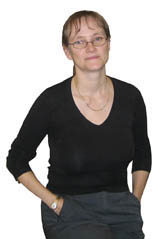AROUND THE QUADS
5 Minutes with... Susan Pedersen
Professor Susan Pedersen teaches British and European history. She earned her B.A. and Ph.D. at Harvard and joined Columbia’s faculty in 2003. CCT caught up with her in October to find out more.
Q: Where are you from?
A: Oh, gosh. My parents were Lutheran missionaries who moved to Japan and then to Minnesota. If I’m from anywhere, I’m from Cambridge, Mass., where I moved to go to Harvard in 1977.
Q: Where did you teach before Columbia?
A: I taught at Harvard on the history faculty from 1988-2003.
Q: What led you to Columbia?
A: It was a combination of personal and professional reasons. My husband is at NYU. We had young children, and I thought it would be nice for us to all live in the same town. I also had been at Harvard a very long time, and wanted to get to know a new institution . and I was very impressed by the historians here. Although it’s a group with an intense research agenda, they’re also very serious about teaching undergraduates.
Q: What are the differences between Harvard and Columbia, for a teacher?
A: The capacity and enthusiasm of the students is similar. Columbia students are a
little edgier, a little less dutiful (though still very dutiful). The main difference in curriculum is the Core. I’ve started teaching in the Core and I’ve become a big fan. It’s much more intense and demanding than anything done as a common curriculum in most other places. Because of CC, when students come into my history classes, they’ve read Burke and Wollstonecraft. They know
what Rousseauian means. Also, because the thinkers are tough, it gives the students a chance to really wrestle, test their convictions against tough people. If you’re going to work out your own ideas, you could do worse than working them out by arguing against Kant or Aristotle.
Q: Was teaching CC a lot of work?
A: I’ve never worked so hard in my life. You can’t teach it unless you reread the material with care. It was like being an undergraduate again, doing my reading at 2 a.m - a romantic experience. I’m teaching the full course next year, and it’s going to eat up my year.
Q: What’s new in the history department?
A: There’s a new initiative called “The History Lab,” designed to help undergraduates to write history and be historians, not just study history. The department always has been interested in getting students to do primary research. They’re going to work in conjunction with the librarians, including the oral history librarian, to learn more about research techniques.
Q: Are you teaching much this year?
A: This is an odd year, because I’m mostly teaching research seminars - the undergraduate senior thesis seminar and graduate students. Next year is more typical: I’m teaching CC for the whole year, the 20th century British history survey and a course on the League of Nations.
Q: Where do you live?
A: On 110th and Broadway, in the same building as the Columbia School. That’s where my children go.
Q: What’s your favorite food?
A: Soft-shelled crabs.
Q: What is the last movie you saw?
A: Little Children, two days ago.
Q: Coffee or tea?
A: Coffee. I don’t like tea at all.
Q: Where do you like to vacation?
A: Our home away from home is Berlin, where my husband runs “NYU in Berlin.”
Q: If you weren’t teaching, what would you be?
A: I can only be a professor.
Interview and photo:
Rose Kernochan
'82 Barnard
|









